Becoming a success in business is not an overnight task. In fact, it can take years, if not decades to achieve a level of success that you are satisfied with, depending on your own personal goals and milestones that are important to you. Whether you are launching a business for the first time or investing in an established brand you believe in, it is essential to familiarize yourself with business shortcuts and what they can mean for you, both positively and negatively.
Types of Shortcuts
There are different types of shortcuts that are found in all realms of business, from the hiring process to managing inventory and outsourcing talents.

There are some shortcuts that help to lead you to success, which are useful to your business and allow you to remain productive while boosting the overall performance of your team.
However, there are also shortcuts that can result in unexpected outcomes, especially if you are shortening the time spent on tasks that require more. These shortcuts do not increase productivity but can quickly become detrimental as they decrease the time spent on important facets of your business. Cutting time from important tasks or areas can quickly cause your business venture to suffer.
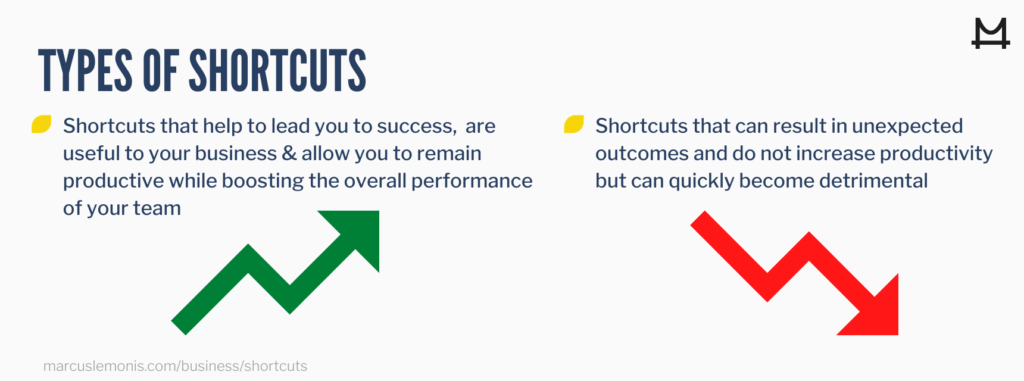
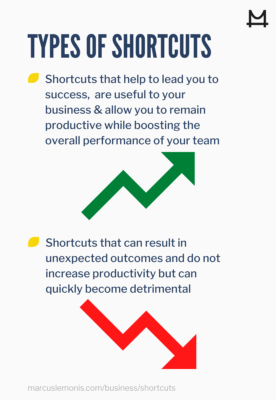
When You Shouldn't Take Shortcuts
Although at times it may be worth it to take a shortcut in business, it is imperative to steer clear from taking shortcuts regularly, especially when it comes to cutting time or your business finances. Never take shortcuts when it comes to hiring, managing inventory quality, customer service, or financials, especially when you are just starting out and entering new territory.
Any time there is a major risk of health, safety, or financial wellbeing, shy away from taking a shortcut, even if you believe it may help you to get ahead at a much quicker rate. Putting the time and effort necessary into difficult actions and tasks is not only a way to protect and insulate the future of your business, but it is also optimal for growth and for gaining a better understanding of how to properly navigate and run a business.
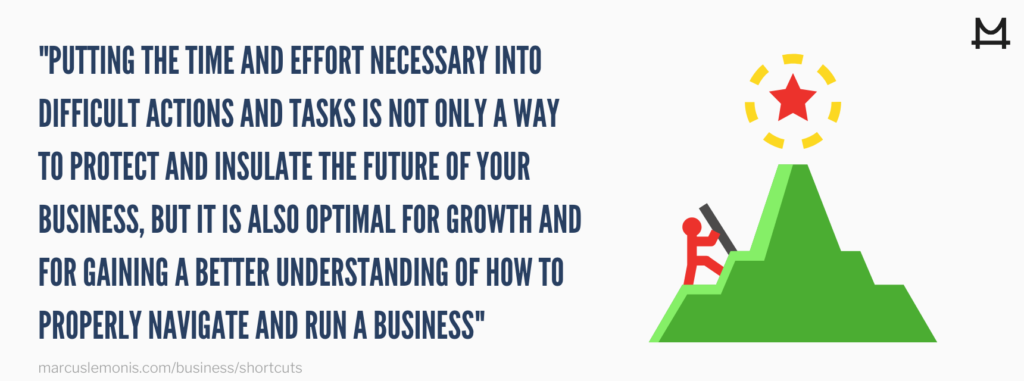
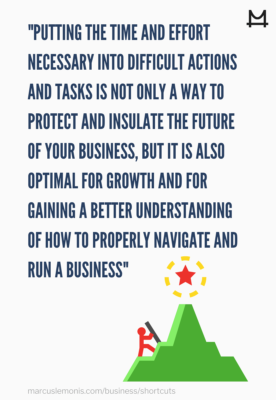
Five Areas You Should Definitely Not Take Shortcuts
1. When Assessing Risk
When you are in the process of assessing risk, avoid taking shortcuts as this may cost you your entire business altogether, especially if you are hanging in the balance financially. Additionally, if you underestimate how important risk may be to running and maintaining your business long-term, you may fail to see potential liabilities. When assessing risk, before taking a shortcut in business consider how the risk itself may impact the health, safety, and overall viability of your business.
In one instance, Marcus attempted to help save an Illinois-based restaurant and food truck, from crippling debt and financial strain. The owner appeared to be in the dark when it came time to talk money with Marcus, especially when discussing his own personal financial struggles as well as taxes he owed and the company’s mounting debt.

Although Marcus found himself increasingly anxious about working together, he felt drawn to help provide assistance to those who had also invested in the business, including the owner’s relatives as well as another partner of his.
Marcus offered to help by providing a loan in exchange for control over the finances and direction of the company, providing Marcus with a 51% controlling interest stake. However, this seemed impossible for the owner, who preferred to remain in control without having a true grasp on what needed to be done to save his business from going under.
In the end, Marcus decided to walk away, as the owner had proven himself a bit too inflexible rather than maintaining a mindset of working together and providing for his employees. While the business survived for a short time after Marcus’ visit, unfortunately, it is no longer in operation today.
2. If the Stakes are High
If the stakes are high for your business, you may feel as if you do not have anywhere else to turn but a risky situation or deal. However, it is important to focus on conducting business and completing tasks properly rather than working to resolve the issue(s) you are experiencing as quickly as possible.

If your entire business and everything you have worked for and built is on the line, the last thing you should do is bring even more risk into the situation.
If you are dealing with tax liens, mounting debt, or even a crippling loss of sales, you may be tempted to take a shortcut or seek out bargains to help your business stay afloat. Choosing to make hasty and risky decisions can have long-term consequences that are even more difficult to recover from if you are not careful. When everything is on the line, it needs to be done right.
In another high stakes scenario, Marcus teamed up with a family-owned Florida furniture business to help save it from going under. As a generational business, Marcus warned the original partners of the business that it was important to align their vision with their current successors, including the son of one of the original owners, to prevent failure later on down the line. At first, it was challenging to work with the father-son team after Marcus noticed the father consistently shutting down new ideas from his son.

However, Marcus was able to discuss the matter with them and work towards a compromise. In the end, Marcus offered a significant investment for a 45% stake in the company, also offering to help pay the family’s outstanding mortgage, bringing the owner’s wife to tears of joy.
Ultimately, they decided to make a deal and work together, aligning the owner’s original vision with his son’s vision, creating a new and improved synergy. Today, the furniture business is performing better than ever due to Marcus’ ability to help get the family focused and back on track for success.
3. When Dealing With Health and Safety
When dealing with the health and safety of employees, partners, investors, clients, and customers, it is imperative to put them first and avoid any and all shortcuts, regardless of the issue at hand.

When an individual’s health and safety are at risk and you take shortcuts with your business, the business is not only legally responsible and liable for their actions, but also financially liable. This is one area where cutting corners will never pay off.
If you have to spend a little extra time or money to make sure your company is 100% in compliance with health and safety guidelines, it will be well worth the investment for both your business and your peace of mind.
4. During the Hiring Process
Hiring new employees can help to increase workplace productivity while also providing a boost to the morale your current team has, especially as your current employees receive assistance and relief from the addition of a new coworker. While it may be tempting to hire as many qualified individuals as possible for your business, it is important not to take shortcuts during the process.
If you have a vision of long-term success for your business, you need to hire the right people, which may take more time and a much more thorough interviewing process.

By getting to know individuals through multiple rounds of interviews, you can feel much more confident about your hiring decision rather than taking shortcuts and hiring individuals based on first impressions alone.
If you opt to cut corners and take shortcuts in the hiring process, you may find yourself hiring people who are unqualified or those who simply lack the skills necessary to succeed in their designated position. Dealing with letting individuals go, firing employees, and even providing unemployment benefits can quickly take up a lot of your time and financial resources, which is why hiring the right professional in the first place is key.
5. Conducting Market Research
Conducting market research is one of the most important elements of owning and operating a successful business and brand, regardless of the market or industry you represent. Cutting corners and taking shortcuts when it comes to gathering data and valuable insights into your preferred demographics and target audience can have devastating and disastrous results.

Because market research can quickly add up in costs, it is essential to avoid cutting corners and instead, opt for the most accurate research and testing available within your budget in order to launch truly effective and engaging marketing campaigns that result in driving sales and attracting customers.
When conducting market research, it is highly advisable to take it slow to ensure that you are getting accurate data whenever possible and from any location where you are collecting information.
Taking your time while you are harvesting user information and data as it pertains to your own business and the products or services you offer can help you to craft successful marketing campaigns with just about any medium (online or off) of your choosing.
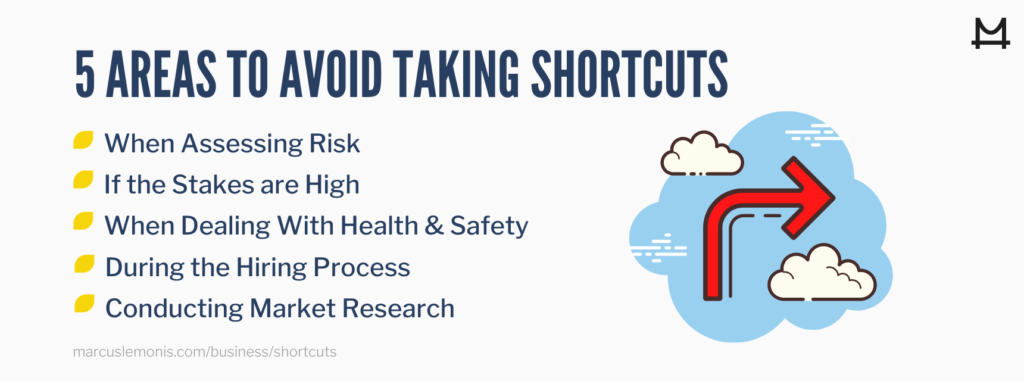
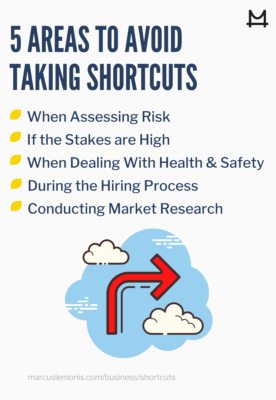
Taking shortcuts in business is not a new practice, but it can have serious and, in some cases, irreparable effects if done incorrectly or improperly. Once you are familiar with various shortcuts that are available to you and the risk and ramifications they pose, you can make informed choices for the direction of your business while still feeling comfortable with and confident in your decisions.
- How will you prevent yourself from taking shortcuts?
- What are some ways you can benefit from avoiding shortcuts as a business?





